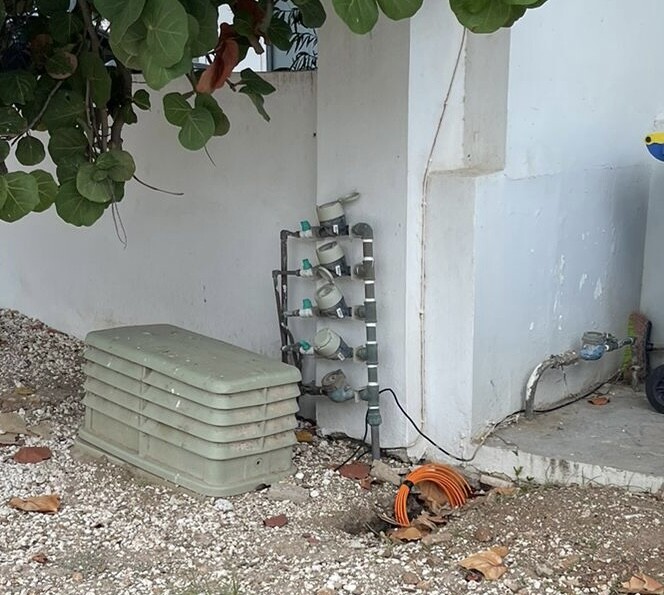Aruba’s Housing Crisis II: Airbnb-type Owners & Abuse of Policies and Subsidized Rates
In my previous column, I discussed how foreign-owned condominiums and homes used for Airbnb-type businesses drive up housing prices for locals in Aruba. Now, I want to address another concerning issue related to Airbnb-type business in Aruba: its misuse of policies and subsidized rates provided by our local utility company.
Misuse of residential water rates
Reports indicate that some Airbnb-type owners in Aruba are taking advantage of lower residential water usage rates by installing split meters on their properties. This practice effectively divides the water usage among multiple meters, enabling them to pay significantly reduced fees for their water consumption.
WEB ARUBA N.V. charges tiered pricing for water usage, meaning residential customers receive discounted rates on their initial cubic meters of monthly usage. The purpose is to make water affordable for people’s homes – something everyone needs. Airbnb-type owners have discovered ways to circumvent the system by installing multiple meters within their properties and splitting the water usage between them to receive lower rates. They claim they own apartments and have the right (or desire) to control individual consumption. But let’s look at the numbers.
Let’s look at the numbers
Let us assume a customer uses 50 cubic meters of water in one month. Under standard billing breakdown, the first 6 cubic meters are charged at Afl 5.75, the following 6 at Afl 7.90, the following 8 at Afl 14.20, and finally, the remaining amount at Afl 19.20 – giving a total cost of Afl 771.50 or an average cost per cubic meter of 15.43 centimeter at this rate.
However, if the customer divides water usage among four meters, each will consume 12.5 cubic meters. In this scenario, the first 6 cubic meters are charged at Afl 5.75 per cubic meter, the following 6 at Afl 7.90, and finally at Afl 14.20; the total cost comes to Afl 89 with an average expense of 7.12 per meter. By using multiple meters, though, costs per cubic meter can be dramatically reduced from Afl 15.40 to 7.12, saving 8.28 per cubic meter – amounting to Afl 415.50 in savings across 50 cubic meters consumed!
Great for them, but this practice is effectively subsidized by those who do not or cannot split their meters, as they must pay more to cover the costs of those taking advantage of lower residential rates. Using multiple meters to receive lower rates, Airbnb owners receive a subsidy never intended for them.
WEB Website Terms and Conditions
This practice may not be in accordance with WEB’s general terms and conditions. Article 12, Paragraph 1a states that when a residence is used for business purposes, then the commercial rate should apply; any rental less than 90 days under local law (vergunningsverordening) counts as a commercial activity, and so Airbnb type owners using their properties as short-term rentals are effectively running a commercial operation and should pay the appropriate commercial rate for water usage.
Misuse of residential electricity rates
Similar to the tiered water billing approach, the electricity rates are structured based on the amount of power consumed by the customer. For residential customers, the energy charge is determined by the number of kilowatt-hours (kWh) used, with different rates for different usage levels. The first 500 kWh is charged at Afl. 0.3853 per kWh, while the range between 501-1000 kWh is charged at Afl. 0.3965 per kWh. Any usage over 1000 kWh is charged at Afl. 0.5216 per kWh. For commercial use, the small business rate is Afl. 0.6113 per kWh, with a fixed charge of Afl. 100.00. As Airbnb is a business activity, in principle, Airbnb-type owners should be charged the small commercial rate rather than the residential rate. Airbnb-type owners need to comply with these regulations and pay the appropriate rates to ensure that they contribute their fair share to the electricity cost and support the local economy.
Misuse of residential propane gas rates
This issue is not limited to water usage; Airbnb-type owners should pay commercial rates for propane gas instead of the subsidized residential rate. This point should be considered as it demonstrates that taking advantage of subsidized rates for water usage is not exclusive to Airbnb owners. Propane gas is a necessary resource for many properties, and the subsidized residential rate was designed for families in mind who depend on it daily for survival. However, short-term renters of real estate properties should know they are operating a business and must pay the appropriate commercial rate to use propane.
Misuse of long-lease residential rates
Airbnb-type properties located on long-lease land (erfpacht) should pay the appropriate long-lease fees (canon) based on commercial usage rather than residential usage. Long-lease land is a unique aspect of Aruban real estate markets, where residents can lease land for up to 60 years at an annual fee called “canon.” The fee for houses is based on residential usage. Airbnb-type owners who rent their properties out as short-term rentals should pay the appropriate fee based on commercial usage. Doing so creates parity between vacation rentals and bona fide hotels across Aruban markets.
This issue also needs to be addressed, as Airbnb-type owners are taking advantage of a reduced long-lease fee. Not only does this result in lost revenue for the government, but it also undermines the purpose of a long-lease land system: providing affordable land for residents to build homes. Using it for commercial purposes, Airbnb-type owners effectively push out those searching for affordable housing solutions. The question can even be raised if the government should not apply a (much) higher long-lease rate to foreigners.
Negative Light on Vacation Rentals
All these aspects negatively impact Airbnb and vacation rentals in Aruba. Although they may provide (foreign) real estate property owners with an additional source of income, they are taking advantage of subsidies and policies intended for residents rather than businesses. This creates an unfair advantage over other businesses and residents and has detrimental effects on the community and local economy.
Tourism Levy Tax 12.5%
Vacation rental properties such as those listed on Airbnb must obtain an accommodation license and pay the tourism levy tax of 12.5% on daily rentals. This tax provides crucial revenue for Aruba Tourism Authority, which works hard to promote and sustain tourism quality on the island. Airbnb-type owners who fail to comply with this tax effectively skip out on their fair share and take advantage of the local economy without contributing. Not only does this result in a loss of revenue for the Aruba Tourism Authority, but it also undermines efforts to maintain high standards within the island’s tourism industry. Therefore, it is essential that vacation rental properties – including those listed on Airbnb – adhere to the same standards as hotels and pay all necessary taxes and obtain licenses. Doing this guarantees they comply with the law and contribute to the sustainable growth of Aruba’s local economy and tourism industry.
Leveling the playing field
Airbnb owners enjoy a distinct advantage over residents and other companies who pay commercial rates for water, electricity, and gas, resulting in unfair competition for the hotel and losses for both government and utility companies. As such, Airbnb owners must be held accountable and pay appropriate rates for their propane gas usage just as they should for water and propane gas usage.
Call to Action
Therefore, the community should urge WEB, ELMAR, gas companies, and the Department of Infrastructure and Planning (DIP) to review their policies and subsidies to residential customers to ensure Airbnb-type business owners or owners of multiple properties aren’t misusing them. Furthermore, there should be increased oversight and regulation for vacation rental properties so that they abide by laws instead of taking advantage of loopholes.
Conclusion
Aruba’s housing crisis is compounded by the growth of foreign-owned properties and vacation rentals, compounding an acute issue. Airbnb-type owners in Aruba are taking advantage of various subsidies and policies intended for residential customers, leading to detrimental effects on both community life and local economies. Residents in Aruba are being priced out of the housing market while tourists and foreign investors benefit. It is time for government and local authorities to act and ensure Aruba’s housing market is accessible and affordable for every resident – not only will this boost the economy and residents but also create a sustainable and affordable housing sector for future generations.














